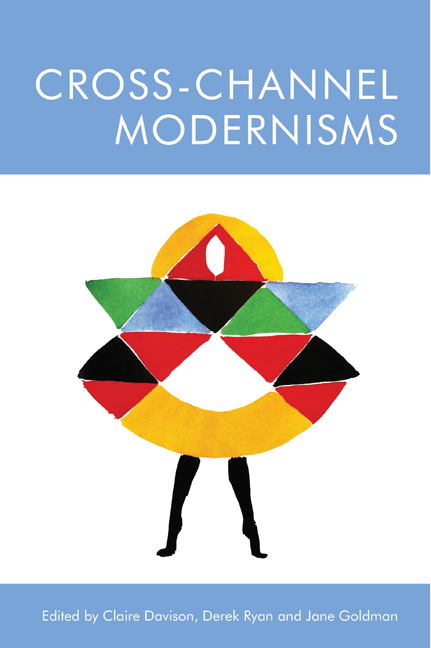Book contents
- Frontmatter
- Contents
- List of Figures
- Notes on Contributors
- Introduction: Cross-Channel (Transmanche) Modernisms
- Interlude: Translating
- 1 On Unknowing French? Rhythm and Le Rythme on a Cross-Channel Exchange
- 2 Impressions of Translation: Ford Madox Ford’s Cosmopolitan Literary Crossings
- 3 Sydney Schiff and Marcel Proust: Table-talk, Tribute, Translation
- Interlude: Fashioning
- 4 Cross-Channel Modernisms and the Vicissitudes of a Laughing Torso: Nina Hamnett, Artist, Bohemian and Writer in London and Paris
- 5 Jean Rhys’s comédie anglaise
- 6 Betray to Become: Departure in James Joyce’s A Portrait of the Artist as a Young Man
- Interlude: Mediating
- 7 Close Up and Cross-Channel Cinema Culture
- 8 Debussy at the Omega Workshops
- 9 Across the Other Channel: Elizabeth Bowen and Modernist Mediation
- Coda: ‘You, who cross the Channel’: Virginia Woolf, Departures and the Spectro-Aesthetics of Modernism 215
- Index
Interlude: Translating
Published online by Cambridge University Press: 03 October 2020
- Frontmatter
- Contents
- List of Figures
- Notes on Contributors
- Introduction: Cross-Channel (Transmanche) Modernisms
- Interlude: Translating
- 1 On Unknowing French? Rhythm and Le Rythme on a Cross-Channel Exchange
- 2 Impressions of Translation: Ford Madox Ford’s Cosmopolitan Literary Crossings
- 3 Sydney Schiff and Marcel Proust: Table-talk, Tribute, Translation
- Interlude: Fashioning
- 4 Cross-Channel Modernisms and the Vicissitudes of a Laughing Torso: Nina Hamnett, Artist, Bohemian and Writer in London and Paris
- 5 Jean Rhys’s comédie anglaise
- 6 Betray to Become: Departure in James Joyce’s A Portrait of the Artist as a Young Man
- Interlude: Mediating
- 7 Close Up and Cross-Channel Cinema Culture
- 8 Debussy at the Omega Workshops
- 9 Across the Other Channel: Elizabeth Bowen and Modernist Mediation
- Coda: ‘You, who cross the Channel’: Virginia Woolf, Departures and the Spectro-Aesthetics of Modernism 215
- Index
Summary
‘Much of Anglophone modernism was constituted by translation’ (Piette 2018: 371). In his entry on ‘Translation’ in The Edinburgh Dictionary of Modernism, Adam Piette underlines the dizzying array of cultural and linguistic translation activity that influenced or was produced by modernists, primarily, though not exclusively, in Britain and Ireland. As Piette recounts here, and more fully in his introduction to an earlier special issue on ‘Modernism and Translation’ for Translation and Literature, aesthetic innovation and avant-garde creeds from the continent found homes in little magazines and small presses, while full-length works by the likes of Marcel Proust, Fyodor Dostoevsky and Anton Chekhov were given major translations. To mention only a handful of examples, writers including T. S. Eliot, Ezra Pound, Virginia Woolf and Vita Sackville-West were involved in translating the work of others, while Samuel Beckett translated his own work and James Joyce closely supervised translations of Ulysses and Finnegans Wake (see Piette 2003). France stands out in this story as the most important influence on the English literary and artistic scene, though what tends to be emphasised is that which anglophone culture belatedly learned from the continent – captured most famously, perhaps, in the example of Roger Fry collecting artworks to display at the 1910 Post-Impressionist Exhibition at the Grafton Galleries in London. Less attention has been paid, within anglophone modernist studies at least, to the back-and-forth nature of the relationship and how it was facilitated by various modes of Channel crossing. The question of how to account for the undoubted influence of France on specific instances of English modernism without reducing it to a one-way process is at the heart of this book's opening section.
Focusing on different practices and conceptualisations of modernist translation, each chapter here attends to francophone texts and contexts as much as to the anglophone. Claire Davison charts the changing significance of the slippery term ‘rhythm’ from the original philosophical texts of Henri Bergson through the publication of John Middleton Murry's Rhythm magazine. Max Saunders explains how Ford Madox Ford's efforts to find exactitude in translation could paradoxically lead to a sizable helping of translator's licence when it came to accuracy in description, illustrated by Ford's account of translating one sentence from Gustav Flaubert's Trois Contes (1877).
- Type
- Chapter
- Information
- Cross-Channel Modernisms , pp. 14 - 18Publisher: Edinburgh University PressPrint publication year: 2020



